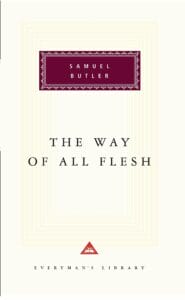
Book Summary
The Way of All Flesh is a very interesting book written by Samuel Butler. It tells the story of a young boy named Ernest Pontifex and his journey through life. This book is considered a classic and has been loved by readers for many years.
In The Way of All Flesh, we follow Ernest as he grows up and faces many challenges. We see him struggle with his strict and controlling family, who have very high expectations for him. Ernest wants to follow his own dreams and passions, but his family wants him to do what they think is best for him.
As Ernest grows older, he starts to question the values and beliefs that his family has taught him. He realizes that he wants to live his life in a different way, one that is true to himself. This book teaches us the importance of being true to ourselves and following our own dreams, even if it means going against what others expect of us.
The Way of All Flesh is a thought-provoking book that explores themes of family, identity, and personal freedom. It shows us that it’s okay to question the beliefs and values that we have been taught and to forge our own path in life. The characters in this book are well-developed and relatable, and the story keeps you engaged from beginning to end.
One of the interesting aspects of this book is how it reflects the time period in which it was written. It was published in 1903, a time when society had very strict expectations for individuals, especially within families. The author, Samuel Butler, uses this story to critique these societal norms and encourage readers to think for themselves.
Samuel Butler was an English author who lived from 1835 to 1902. He wrote many books and was known for his satirical and thought-provoking writing style. The Way of All Flesh is considered one of his most famous works. Butler’s writing continues to be celebrated for its insightful commentary on society and human nature.
“The Way of All Flesh” is a semi-autobiographical novel written by Samuel Butler, first published posthumously in 1903. The novel is a scathing critique of Victorian-era societal norms and institutions, particularly the Church of England and the traditional family structure. It follows the life of Ernest Pontifex, from his childhood to adulthood, and his struggles against the oppressive forces of his family and society.
“The Way of All Flesh” is a profound exploration of the human condition, a biting satire of Victorian society, and a powerful critique of religious hypocrisy. The novel is a rich tapestry of characters, each more vivid and complex than the last. The protagonist, Ernest Pontifex, is a deeply flawed yet sympathetic character whose struggles against the constraints of his society are both heart-wrenching and inspiring.
The novel is divided into four parts, each corresponding to a different stage in Ernest’s life. The first part introduces us to Ernest’s parents, Theobald and Christina, who are both deeply religious and strict disciplinarians. The second part follows Ernest’s childhood and adolescence, marked by his parents’ oppressive control and the stifling atmosphere of his school. The third part sees Ernest as a young man, struggling to find his place in the world and grappling with his religious doubts. The final part follows Ernest’s journey towards self-discovery and liberation.
Butler’s writing is sharp and incisive, his observations about society and human nature are astute, and his satire is biting. He paints a vivid picture of Victorian society, with its rigid class structure, its stifling moral codes, and its hypocritical religious institutions. Yet, despite its bleak portrayal of society, the novel is not without hope. Ernest’s journey towards self-discovery and liberation is a testament to the human spirit’s resilience and the possibility of change.
“The Way of All Flesh” is a powerful critique of Victorian society and its institutions. Butler uses the novel to expose the hypocrisy and corruption of the Church of England, the oppressive nature of the traditional family structure, and the stifling effect of societal norms on individual freedom and self-expression.
The novel’s central theme is the struggle for individual freedom against societal constraints. Ernest’s journey towards self-discovery and liberation is a metaphor for the human struggle for freedom and self-expression. His rebellion against his parents and the Church represents the individual’s struggle against oppressive societal institutions.
Butler also explores the theme of hypocrisy, particularly religious hypocrisy. The character of Theobald, Ernest’s father, is a clergyman who preaches piety and virtue but is himself a hypocrite and a tyrant. This critique of religious hypocrisy is a recurring theme in Butler’s work and is a reflection of his own disillusionment with the Church of England.
The novel also explores the theme of the oppressive nature of the traditional family structure. Ernest’s parents are portrayed as oppressive figures who stifle his individuality and freedom. This critique of the family structure is a reflection of Butler’s own experiences with his family.
Samuel Butler (1835-1902) was an English author and critic, best known for his satirical novels “Erewhon” and “The Way of All Flesh”. Born into a family of clergymen, Butler was expected to follow in their footsteps. However, he rebelled against this expectation and pursued a career in literature instead.
Butler’s work is characterized by its satirical critique of Victorian society and its institutions, particularly the Church of England and the traditional family structure. His novels are known for their sharp wit, their incisive social commentary, and their exploration of themes such as individual freedom, hypocrisy, and the oppressive nature of societal norms.
Despite his critical success, Butler’s work was largely ignored during his lifetime. It was only after his death that his novels gained recognition and acclaim. Today, Butler is considered one of the most important English authors of the 19th century, and “The Way of All Flesh” is considered his masterpiece.
Don Quixote by Miguel de Cervantes
Miguel de Cervantes
Read Now →